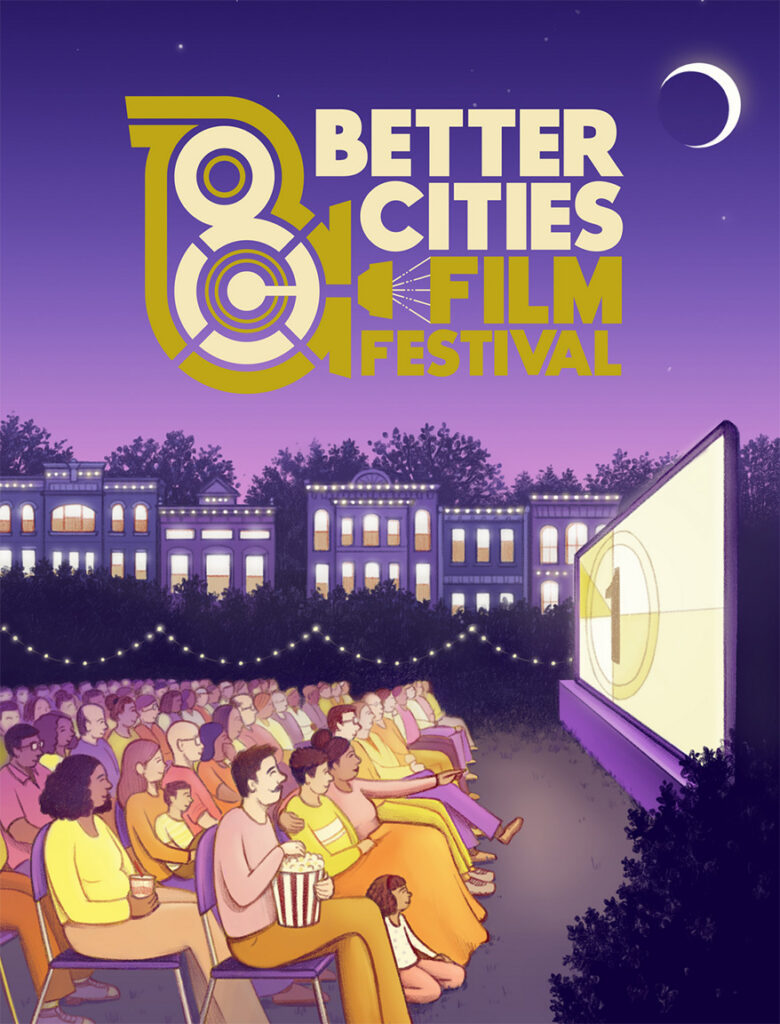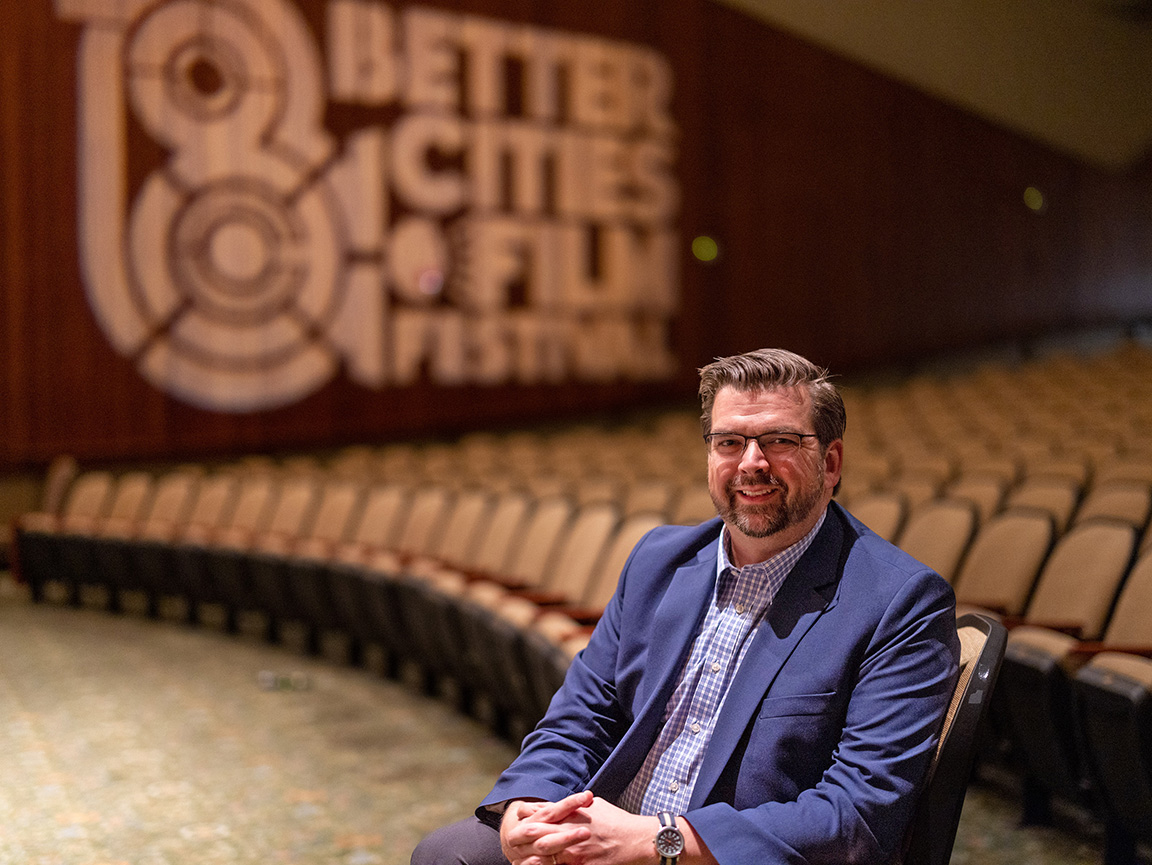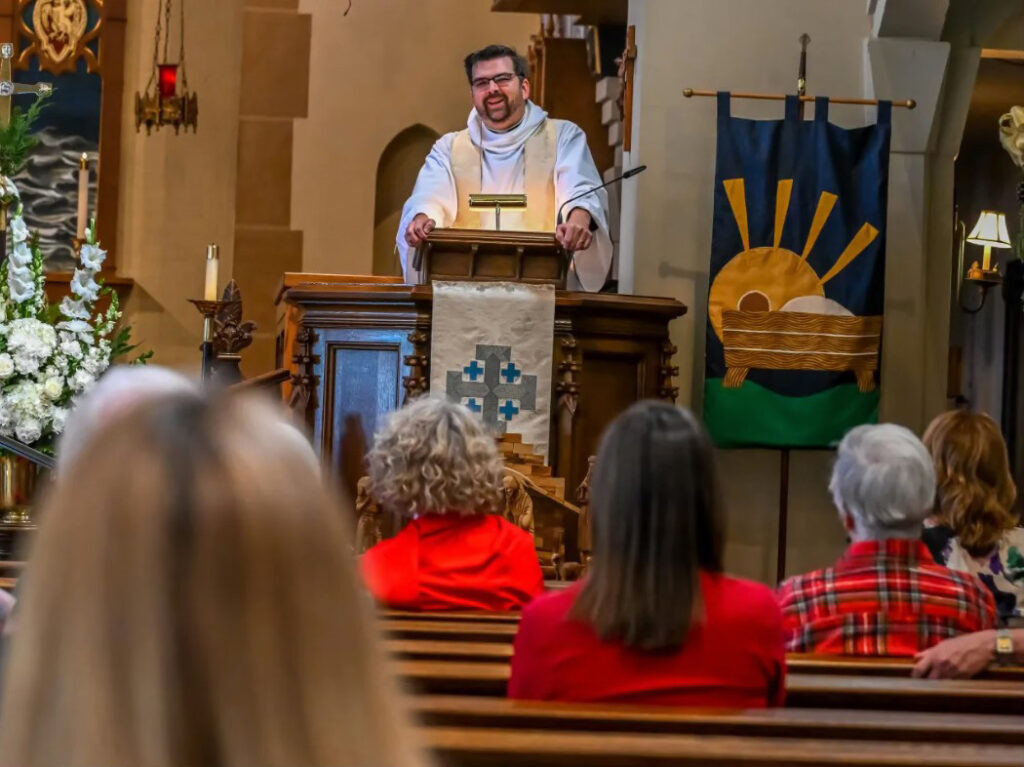
A poster for Better Cities Film Festival, directed by Episcopal priest Josh Paget, reflects its community spirit.
[The Episcopal News] For the Rev. Josh Paget, an associate rector at St. Cross Church in Hermosa Beach in the Episcopal Diocese of Los Angeles, hosting a film festival in Detroit seemed natural, given the kindred spirits of the city and Paget’s Better Cities Film Festival.
“Detroit is known for its revitalization efforts and has inspired so many people to do different projects. There’s so much going on there at every level,” Paget, 42, told The News during a recent telephone interview. Noting that the city’s informal motto is “Detroit hustles harder,” he added, “The community is so great and supportive of the festival. They are at the forefront of thinking about ways to make cities better.”
The festival runs Sept. 19 – 22 and will feature international documentaries about city walk-ability and bike-ability, community empowerment, and sustainable transportation, as well as films by Detroit movie makers. The main venue is Campus Martius, a city park in Detroit.
Paget, a former stand-up comic and comedy club manager who was ordained in 2021, said he created the festival eleven years ago and moved it from Los Angeles to the Motor City in 2020. “I was trying to think about how we shape our cities and how they shape us,” he said. “I wanted to take that conversation out of council chambers and public comment, out of the classroom and academic setting … and have frank pedestrian conversations about the things that affect us.”
His passion for urban planning and design led to creation of the festival, now managed with his brother John Paget and friend Chris Elisara. Its spirit directly stems from Paget’s priestly calling, Elisara said.
“He loves people, he loves communities. He wants to invest in community, and the film festival is a way he could invest in community, community development, community wellbeing, because he knows the power of story to pull a community together, to empower, to inspire a community.”
After experiencing Detroit and “the energy, the resilience of community there, the entrepreneurship, the community spirit to turn the city around and come back again … (we) knew it was a great fit” to move the festival there, said Elisara, who describes himself as an urbanist, a filmmaker and a storyteller.
“Detroit never gave up on itself,” he added. “Other people gave up on it. But the community never gave up on itself. Through the hard times it had, it knew that there was a better future if they came together, if they hung tough, if they pulled together, that they could forge a new future – and that’s what they’re doing.”

Josh Paget draws on his passion for ministry, film, architecture and urban design to shape the Better Cities Film Festival, which began in Los Angeles and moved to Detroit. Paget is associate rector of St. Cross Episcopal Church, Hermosa Beach.
Partnerships have sprung up along the way, with local community groups, such as the Detroit Downtown Partnership; Planet Detroit, a local environmental organization; Wayne State University; and for the first time this year, with a local congregation, Christ Episcopal Church near downtown Detroit, where the festival will conclude September 22.
Christ Church, founded in 1845, “is the oldest Protestant church at its original location in the city,” according to the Rev. Emily Williams Guffey, rector. The congregation is in the middle of a $3 million capital campaign to restore the parish hall, “where the film screening will take place, and parts of our sanctuary as well,” said Guffey. “It’s wonderfully serendipitous that the screenings will be about architecture and community empowerment.”
Concessions sales proceeds will be donated to the church’s feeding ministry. “We are looking to grow it from bag lunches to a hot meal,” said Guffey. She hopes that engaging the arts and architecture and the design community in Detroit will raise visibility for the program.
“We are working with local architects … and engaging the community and revitalizing the hall so that it lives its purpose in more and better ways,” Guffey said.
“We’re a congregation that loves and prioritizes the arts and I’m excited for our congregants, neighbors and friends to be inspired about architecture and community engagement through the art of film,” she added. Visual artists, master gardeners, botanists, painters, florists, film buffs and local choirs, including interfaith and barrier-free ensembles, or those who welcome anyone who wishes to sing, constitute the church’s community spirit.
The line-up of films includes: “Let’s Roll,” about bicycling, to be followed by a group bike ride from the Campus Martius to the Detroit Month of Design’s signature event, “Eastern Market After Dark.” Others include “Let’s Get Going,” on mobility and transit; “Freak Bikes,” a film by Ryan Mekenian exploring the intersection of fatherhood and coming-of-age with sustainable transportation, climate change, mobility justice, and bicycles.
“Directed by Detroit” includes a group of films from local producers, including “Natural Light: The Remarkable Transformation of a School on East Eight Mile” by Richard R. Murray and “The Land Bank: 20 Years from Crisis to Opportunity” by Robin Schwartz and Grayson Beras.
The festival can also be sponsored in other places.
Carmen Mays was so thrilled to host a one-day Better Cities festival in her Birmingham, Alabama, hometown last year that she’s repeating the effort in 2024, partnering with a local indie theater, “to instigate” a conversation about the city’s future and to address lingering environmental, social, housing and racial issues, she told The News.

Josh Paget preaches at St. Cross Church, Hermosa Beach, where he is an associate rector. Courtesy photo
Using film “was a more effective way of generating conversation and dialogue about what people really want and letting people know they have the power to make these decisions, that the government is not like some machine. It’s the people, and people responding to people.”
In 2023, she screened the PBS documentary “Razed/Raze”, about urban renewal in Charlottesville, Virginia, and Durham, North Carolina which “illustrated the structure of racism and how it conspired to dispossess land from Black people,” Mays said. “It really helped people understand that they don’t have to internalize the conditions of their neighborhood.”
While politically proactive, the festival invokes spirituality, she said. “From a religious standpoint, free will allows us to determine who we are and to self-direct our life. To me, it’s the ultimate expression of democracy and, in a spiritual or religious context, it says this is who I am, this is what I value, and this is the life I need to live.
“What would make me really happy would be building cities that facilitate people being able to move from survival into a ‘thrive-ala’ to execute their purpose.”
In Hermosa Beach, where Paget serves as associate rector, he says has been advocating designing buildings to reflect theology as St. Cross considers building affordable housing on its campus. Paget said, “St. Cross and many churches pride ourselves on our gifts of hospitality and we need architecture to reflect those values.”
